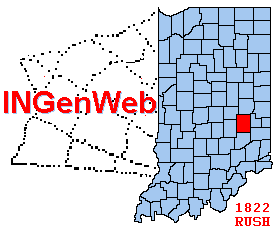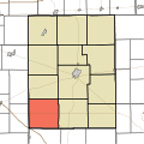

Rush County, Indiana
Genealogy
and History


Rush County, Indiana
Genealogy
and History
Centennial history of Rush County, Indiana
Authors: Anonymous
City of Publication: Indianapolis
Publisher: Historical Pub. Co.
Date: 1921
Transcribed for the Rush Co. INGenWeb Project by Mark S. Mount

This township in the southwestern corner of the county is a “square” township of thirty-six sections, and is bounded on the north by Walker township, on the east by Anderson township, on the south by Decatur county. It is perhaps the most rugged section of the county topographically, the surface being much broken by numerous streams and hills. Big Flat Rock traverses it, entering in section 4, near the northeast corner,and flowing out in section 29, besides which Little Hurricane and Big Mill creeks and two or three other small streams afford ample drainage. Moscow, a village of about one hundred population, in the southeast quarter of section 18, and Gowdy, a cross-roads hamlet in section 1, are the trading centers. Moscow was surveyed by W. B. Laughlin for John Woods, who filed the plat for record May 1, 1830. The township has no railroad, but has excellent highways, as have all parts of the county. Limestone of a good quality for building crops out in the vicinity of Moscow, and quarries have been profitably worked in the past. According to doctor Arnold’s narrative, Moscow in the early days "possessed a reputation far from enviable; in fact, it was famous for lawlessness and ruffianism, but now it is a quiet, orderly village." The village of Moscow dates back to 1822 when John Woods and David Querry built a mill on Big Flat Rock at that point. Nathan Julian presently opened a store at the milling point, which thus became the center of the community, and the village had expanded to such a point in the spring of 1830 that John Woods employed Doctor Laughlin, the pioneer surveyor, to plat the place and get it "on the map." Other early merchants were A. Musselman, John T. Drummond, O’Briend Gwynne and R. H. Johnson, the latter of whom had a partner at Brookville. John Woods, mentioned above, also operated a distillery, as did Joseph Owens, and it is said these were quite liberally patronized, this fact probably accounting for the the "unenviable reputation" borne by the place in the pioneer days, to which reference has been made above. The first tavern was conducted by one Hays and Samuel Harney presently put up another tavern which became quite noted in its way in its day. An organized band of horse thieves operated in the Moscow neighborhood many years ago, making their rendezvous there a distributing point for their plunder.
Bearing on conditions in and about Moscow in an earlier day, the following under the head of "Letter from Moscow," published in a county seat paper in 1872, is informative: "Orange township is called the dark corner of Rush county. Somehow our township has never taken the stand in education, religion or enterprise that has been accorded to some other parts of our county. Moscow is the seat of government for this region. It is little and lifeless, and is no larger than it was twenty years ago, and has only a sad prospect for the future. Once a week the mail comes and the outer world is heard from. Saturdays are great days in our capital, because then we get the mail and all the surrounding country comes in to get the news." That was fifty years ago, and happily, a great change has been made in community conditions during the half-century that has elapsed since then. Ten years ago a consolidated township school was erected at Moscow at a cost of $30,000, and the influence of that school on the community has been a transforming one,indeed. The community has been drawn more closely together by the daily associations of the children in a common motive and in other ways conditions have been bettered. R. H. Glenn, who has been associated with the school almost ever since it was established, is now principal of the same, and is extending the work, the plan now being to erect an addition to the building. It is a matter of note that the longest wooden bridge in the state spans Big Flat Rock at Moscow. Though social conditions at Moscow have been wonderfully improved since the days referred to above by the older chronicle, the town has not grown in size and is but a typical rural hamlet, one store, that of Barlow Bros., being sufficient to supply the commercial needs of the community. The old mill that has stood there along the river bank for near a century, was recently sold out and has been abandoned. The one church in the village, that of the Christian denomination, has been established for many years, but the congregation is worshiping in a handsome new edifice erected within the past few years, the pastor, the Reverend Mr. Selig, of Butler College, coming once a fortnight to minister to the congregation. The complaint uttered by the plaintive writer of the "Letter From Moscow" above noted, that mail reached the village but once a week lost its force when rural free mail delivery was established throughout the county and daily mail brought to the doors of the farmers and villagers now keeps them fully informed. Certainly Orange township no longer can be "called the dark corner of Rush county." The township school and the daily newspapers forbid.
Among the pioneers of Orange township whose names have been preserved by the older chronicles were George Shoppelle, Richard Shaw, Israel Hewitt, Joseph Owens, John Woods, Nathan Allison, John Machlan, Absalom Milligan, Robert Hungerford, William, John and Henry McCarty, John Waggoner, Robert McDuffy, John Mullens, Robert Bowling, Thomas Wilson, Michael Ezekial, Josiah Kelly, Jesse Barlow, Jesse M. Barlow, John Little, Jerome Buffingham, Abraham Rhue, Benjamin Moore, Daniel Querry, David, Joseph and Nathan Frakes, Uriah and Reuben Farlow, Millikin Owens, John Selby, Jarm Farlow, Richard Hungerford, John Hewitt, Isaac Conde, Andrew Stiers, Nathan Aldridge, William Dodson, Elias Hilligoss, Matthew Allison, Absalom Slifer, Thomas Prill, John Griffith, Josiah Bishop, Daniel Tevis, Robert Waggoner, David Alter, Alexander Simpson, Sr., and Peter, Aris and Milton Waggoner.